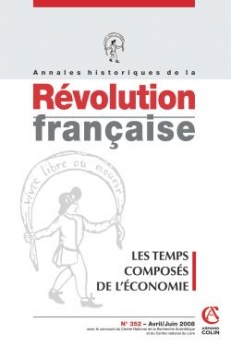
Annales historiques de la Révolution française n° 352 (2/2008)
Pour acheter ce numéro, contactez-nous
Recevez les numéros de l'année en cours et accédez à l'intégralité des articles en ligne.
Dernière grande place négociante et fi nancière avant la frontière septentrionale, Lille joue pleinement son rôle d’intermédiaire entre les marchés parisiens au Sud et belgo-hollandais au Nord sous la Révolution et l’Empire. La déclaration de guerre en 1792 puis la départementalisation des territoires conquis ne font que renforcer la position nodale des acteurs économiques et fi nanciers de la place. Au premier rang d’entre eux, François Briansiaux mobilise effi cacement son important réseau de correspondants, drainant papier commercial et métaux précieux pour son plus grand profi t. Les bilans de faillite révèlent que les autres négociants sont tout aussi actifs, quoiqu’à une moindre échelle, dans cet espace passé sous contrôle français. Enfin, la concentration des institutions du commerce – chambre et tribunal de commerce, hôtel des monnaies, comptoir d’escompte de la Banque de France – conforte la place dans ses fonctions d’intermédiation économique et fi nancière.
The last great commercial and fi nancial center before reaching the northern border, Lille played a major role under the Revolution and Empire as an intermediary between the Parisian markets and those of the Belgians and the Dutch located in the North. The declaration of war in 1792, then the creation of departments in the conquered territories only reinforced the crucial position of those involved in economy and fi nance in this city. First among them, Francois Briansiaux effi ciently mobilized his large network of correspondents, specializing in commerical paper and precious metals to his immense profi t. Bankruptcy reports reveal that other merchants were no less active, if on a smaller scale, in this town under French control. In the end, the high concentration of commerical institutions: the chamber and court of commerce, the mint, the comptoir d’escompte of the Bank of France-assured Lille’s position as an economic and fi nancial intermediary.